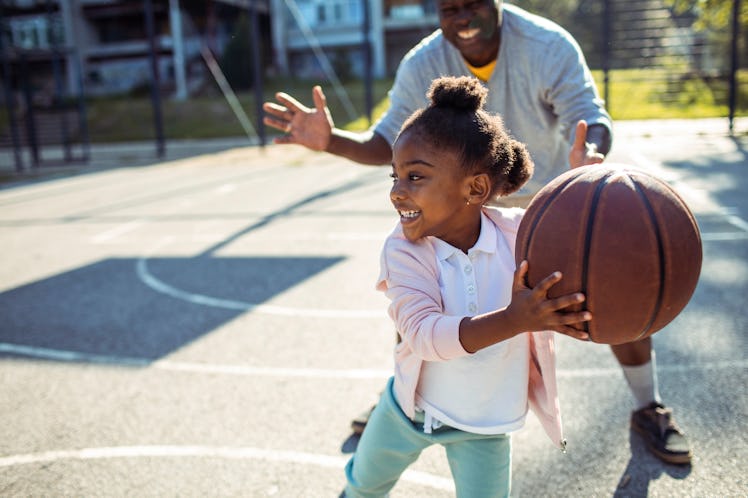Praise The Process, Not The Talent: How To Build A Growth Mindset In Kids
Children who are taught to believe intelligence can grow with hard work are more likely to be resilient and confident when facing challenges.

Your child brings home a good grade on a reading or math assignment. You’re understandably proud and want to acknowledge this achievement and encourage them to keep trying. What do you say? The words are probably out of your mouth before you’ve thought about it: “You’re so smart!” But that may actually be the wrong thing to say.
Parents influence whether or not their children develop what psychologists call a “growth mindset” — a belief that intelligence can be developed over time. Children with this mindset are more likely to take on challenges, bounce back from failure, and believe they can improve with hard work. When parents deliver praise, react to failure, and even gesture and point with their babies, they affect how their children develop and think about their own intelligence.
“In parenting in general, it’s important to provide parents, all parents, just with information early on that they can make a big difference,” says Meredith Rowe, professor of human development and psychology at the Harvard Graduate School of Education. Rowe isn’t trying to scare parents or have them worry about every single phrase. Her point is that these little interactions can help.
The growth mindset is a theory developed by Carol Dweck, a celebrated psychologist at Stanford University and author of Mindset: The New Psychology of Success. In lectures and interviews, Dweck explains that children and adults who are taught that intelligence can be developed with work are more likely to take on challenges, be resilient when facing setbacks, and experience greater confidence and persistence. Those who believe their intelligence is fixed are more likely to give up when they feel challenged, believing they’ve reached the limits of their abilities.
Most people fall somewhere on a spectrum between a fixed and growth mindset, says Rowe. (For anyone curious about where they fall on that continuum, they can take a short quiz on Dweck’s website.) Interventions designed to move kids closer to a growth mindset have proven remarkably effective. In her research, Dweck has found grades go up after students learn that intelligence is malleable and that the neurons in their brains are capable of forming new, strong connections as a result of hard work.
This pattern holds true when it’s parents, not children, getting the growth mindset training. In a 2018 study, Rowe showed parents a short video about how pointing and gesturing contributes to language development for 10- to 18-month-old children, and how a parent encouraging those gestures could positively impact their child’s development. This simple intervention influenced how parents interacted with their children, and on the whole led parents to gesture more. But the effect was strongest for parents who had more of a fixed growth mindset before seeing the video, Rowe explains.
“Parents with a fixed mindset might not think they can make such a difference in their child’s development,” says Rowe. “And so providing that information that actually during early childhood, the environment makes a huge difference in children’s development — and understanding that as a parent — could contribute to the ways you interact, or the opportunities you provide for your child.”
How parents respond to failure in turn influences the intelligence mindset their child develops. In a 2016 study, Dweck found that parents who tended to see failure as an indication of their child’s abilities were likely to have children who believed their intelligence was fixed. Parents who approached failure as an opportunity for growth, in turn, were more likely to teach their children that they can get smarter by working through challenges.
So how can parents work to raise resilient, growth-minded kids? It’s about re-thinking how you commend your children and how you react to their failings. Praise the process and effort a child puts into a task rather than the child’s innate talent, says Rowe. That means swapping a phrase like “you’re so smart” for “it’s great to see you trying so hard at this,” she says. Children praised for their abilities, rather than their hard work, are more likely to view their talent as fixed and stumble when presented with a challenge.
Parents should also be mindful of how they respond to setbacks. Brushing off a failure as something a child simply isn’t good at, or overreacting and seeing a failure as a debilitating setback can both send the wrong message, says Rowe. Instead, parents need to approach these moments as learning opportunities, and help their child figure out how to grow through the setback.
Parents also may need to guard against what Dweck has called the “false growth mindset.” Over the years, the popularity of Dweck’s ideas has led them to be oversimplified and misinterpreted. This includes thinking children just need to try harder in order to succeed, and blaming them for not trying hard enough if they don’t, Dweck explained to Stanford Magazine in 2016. In addition to praising the learning process, parents and educators need to support students as they work through problems, helping them find new strategies or providing helpful tools, she told The Atlantic.
So how should you respond the next time your child brings home a grade, good or bad? Start by taking a deep breath and acknowledging how hard they’re working and how much they’re learning. With any luck, these conversations will help your child become a lifelong learner who’s unafraid to tackle challenges.
This article was originally published on